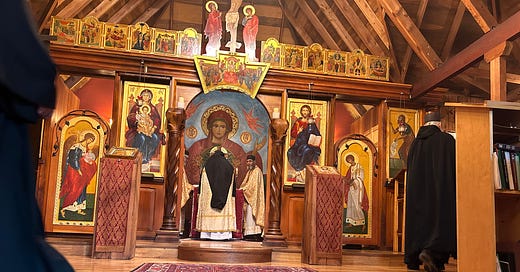A spiritual trap that holds men back from the freedom they are meant to have in Christ is the effort to replace grace, the sheer gift of God, with the achievements of one’s own religious industry. Towers of Babel can take the form of even pious practices when the heart moves away from gratitude and humility for what Christ has done to a sense of entitlement before God. Behind this temptation against the faith is a certain Titanism - a nihilistic effort to collapse the sacred order between the merely human and the divine. Such nihilism betrays a sense of being a spiritual orphan, a prodigal who will not accept the Father’s invitation to celebrate mercy. For such a soul, the world and the self are dangerously unfair, and so is God. One’s eyes are shut to the goodness of the Father, and to protect himself from divine wrath, he must accomplish something so blameless that only a blameworthy god could find fault with it. His self-righteous accomplishments, even if expressed with a certain indignation, are his shield against the hostile forces of the world and in himself for which the vindictive god he worships is also responsible.
If there are many who reject this idol and call themselves atheist, rejection of false worship is always a step toward the truth. This is not the God revealed by Jesus Christ but a work of human hands, a phantom generated by a fearful and resentful imagination. Spiritual orphans are filled with fear and resentment only because their eyes remain shut to the sonship that the true God offers them. In rejecting the idol of self-sufficiency before the sacred, one is not rejecting the sacred itself but only the fear and resentment that idols engender. To approach the truly sacred, a soul needs a different attitude toward God, a different vision of who He is. This is what Christ Jesus came to reveal to those whose journey to the truth does not stop at the rejection of idolatry but continues to true worship, to catholic orthodoxy.
Catholic orthodoxy involves the struggle to open the eyes of our heart to the wonders of God and what He has done in the world for the sake of humanity. This approach to the faith sees in Jesus Christ the eternal Son of the Father sent to us in the fulness of time to reveal the love of God even in the face of our utter hostility against Him. This faith binds us to the Risen Lord in such wise that our own death becomes a participation in His and this with the hope that we will be raised with Him by the same love that raised Him from the dead. Catholic orthodoxy strives to see the world and God through resurrected eyes, eyes over which sin and death have no more power. Such faith sees possibilities that a vision subject to death cannot see, no matter how enlightened in might be with worldly wisdom and spiritual accomplishments.
This is a freedom for a new contemplation, a new beholding of the world, others and even oneself before God. With this new way of seeing, a new freedom opens up. It is the freedom that a son has before his father, the freedom to beloved and to love, the freedom to become the son or daughter that the Father hoped we might choose to be. This is to say, when God pondered us before the foundation of the world, he contemplated an unrepeatable instance of his glory in each one - so that each one unveils his image and likeness in a way that has never been seen before and will never be seen again. What he beheld was so beautiful that in his goodness and love He chose to bring it into its own existence at just the right time for its salvation - so that what he saw might not perish from the world. What did He see? What delighted Him? A new created freedom to love as He loves. This freedom is filled with hope — and the reason for this hope is the inexhaustible love of God that a believer is never separated from. Catholic orthodoxy beholds this love and holds fast this hope - and the most humble prayer offered in this faith opens the whole world to the liberty of the sons and daughters of God.





This is my prayer too, for the grace to love as He loves. Like you say, it requires freedom from hostility to love like He does and delightfully this love leads to more and more freedom.
What struck me in your reflection is when you wrote we need "Freedom against the hostile forces of the world and in himself". When I trace my lovelessness backwards there is usually first an unloving movent in my own heart against myself. This movement, being perhaps too small, or too normal, or to painfull, to capture and offer to my Lord was then is unleashed through my eyes onto the world. It is turning to His love, in hope and faith, evoking His love on myself, in myself that I am gradually set free from this hostility into a greater deeper love. The hosility starts in my heart towards myself and His love has the power to overcome this hostility so that, with Him, I can love more like Him. We are blessed. Thank you for your reflection !